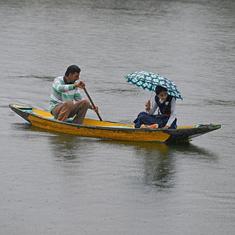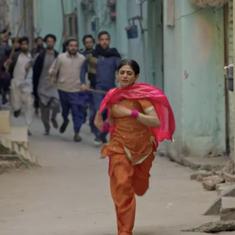In the middle of each year, the calendar of global conscience turns to World Oceans Day on June 8. This year’s theme, “Wonder: Sustaining What Sustains Us”, hangs over Kerala’s ravaged coastline like a cruel joke, as did the motif of World Environment Day on June 5 – “End Plastic Pollution”.
Even as diplomats in Nice and Seoul exchange platitudes about marine conservation, the sinking on May 25 of the MSC ELSA-3 – the container ship, which went down in stormy waters off Kerala’s coast – has revealed what progress truly costs when measured in broken ecosystems and broken lives.
The facts read like an indictment of our times.
On May 24, the Liberian-flagged container ship departed the newly inaugurated Vizhinjam Port into the teeth of the southwest monsoon. Fishing boats had been ordered ashore – the sea was too dangerous for small craft. Yet the 300-metre behemoth, laden with containers (some with calcium carbide, others brimming with polyethylene pellets), received clearance to sail.
Within hours, it listed violently. By dawn, the MSC ELSA-3 lay at the bottom of the Arabian Sea, just 38 nautical miles from the port that had so recklessly released it.
This was no act of God, as insurers and corporations will soon claim. It was the inevitable result of systems that value cargo over communities, schedules over safety and rhetoric over responsibility.
For years, Kerala’s fisherfolk warned that Vizhinjam’s breakwaters would accelerate coastal erosion. Oceanographers documented how the monsoon’s fury made these waters a gamble for large vessels.
Yet when Prime Minister Narendra Modi inaugurated the Adani-built port on May 2, he hailed it as India’s “maritime crown jewel” – a triumph of development over doubt.
As Kerala’s most ambitious port project nears its grand launch, Vizhinjam stands as a symbol of bold governance and strategic investment. With ₹5,370 Cr+ in state funding, it's India’s only major port led by a State pic.twitter.com/jWcnn7nHjd
— VizhinjamInternationalSeaport (@PortOfVizhinjam) April 30, 2025
The ocean answered three weeks later.
Today, Kerala’s beaches wear a new kind of tide line, one marked by plastic pellets, chemical foam and broken shipping containers. Fishing grounds lie fallow, not by choice but by contamination and government fiat to fishers not to fish.
The Kerala government’s response of 6 kg of rice and Rs 1,000 per month to the fishers is not relief. It is plain ridicule.
Meanwhile, the Mediterranean Shipping Company that owns the vessel hesitates to release the full cargo manifest, while the port authorities feign surprise at a disaster they enabled.
The bitter irony? Many sponsors of this year’s World Environment Day on June 5 were corporate giants producing and utilising the very plastics now choking Kerala’s coast. The same shipping industry that treats vessels as disposable assets will doubtless help celebrate World Oceans Day.
Such is the theatre of modern environmentalism – where polluters fund awareness campaigns as their toxins enter the food chain.
True accountability would look different. It would mean:
Corporate reparations by the Mediterranean Shipping Company and Adani funding a full cleanup and livelihood restoration.
Criminal consequences for the officials who cleared the voyage and companies if it is found that the manifests were falsified.
Coastal sovereignty for fisherfolk to veto power over destructive projects
International Maritime Organisation overhaul to ensure blacklists for repeat offenders and mandatory independent inspections
Until then, this annual observance will remain what it has always been – a greenwashed pantomime. The ocean does not need our performative “day”. It needs us to confront the uncomfortable truth: development that destroys its protectors is not progress. It is piracy.
Kerala’s coast now serves as a warning written in water, one we ignore at our peril. For when we sacrifice the environment on the altar of growth, we do not just lose ecosystems. We lose our humanity.
June 8 is World Oceans Day.
John Kurien is a former professor at the Centre for Development Studies in Trivandrum.










